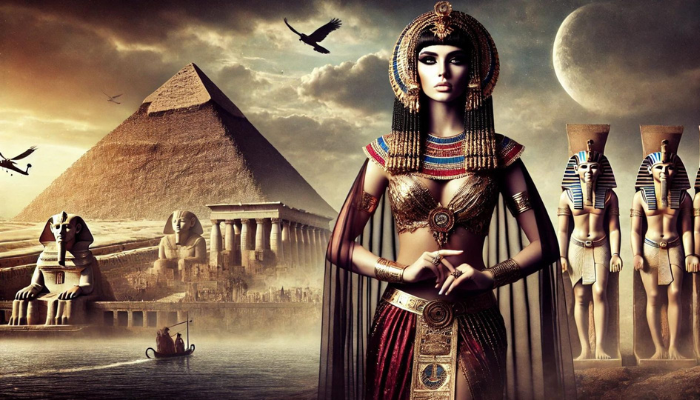1. Introduction
When you think of powerful rulers who have shaped history, Cleopatra VII is a name that immediately comes to mind. As the last pharaoh of ancient Egypt, she ruled during a time of immense political disturbance and intrigue. But how did this iconic figure come to power? And what was her true impact on history?
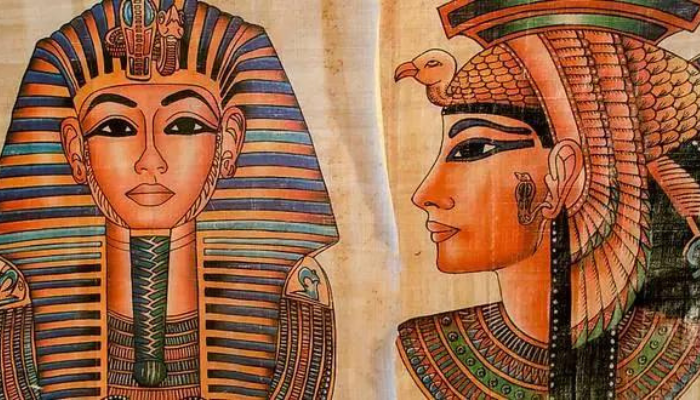
Cleopatra’s story isn’t just about ruling a kingdom; it’s a tale of diplomacy, power struggles, romance, and survival in a world dominated by Rome. Her alliances with two of Rome’s most influential men—Julius Caesar and Mark Antony—solidified her place in history, but also sealed her fate. Cleopatra’s life was filled with dramatic events, from battles to betrayals, and her reign marked the end of thousands of years of Egyptian civilization.
But what made Cleopatra so unforgettable? Was it her intelligence, her political savvy, or her relationships with Rome’s most powerful leaders? By the end of this article, you’ll understand why Cleopatra’s rule wasn’t just significant for Egypt, but for the ancient world as a whole. We’ll explore how she ascended to power, the decisions she made to protect her kingdom, and the lasting legacy she left behind.
- Cleopatra’s reign: A story of survival and strategy amidst Roman expansion.
- Her relationships with Rome: Partnerships that changed the course of history.
Cleopatra ruled from 51 BC until her death in 30 BC, but her influence didn’t end with her reign. Even today, Cleopatra remains a symbol of power, charm, and resilience, captivating historians and storytellers alike. Let’s journey back to ancient Egypt and uncover how Cleopatra shaped not only her own destiny but also the future of her kingdom.
This introduction sets the stage for a deeper exploration of Cleopatra’s reign, making readers feel like they are stepping into ancient Egypt while keeping the content engaging and accessible. Now, onto Cleopatra’s rise to power!
2. Cleopatra’s Rise to Power
Cleopatra wasn’t born into a peaceful, stable Egypt. When she ascended to the throne at just 18 years old in 51 BC, Egypt was already in confusion. As part of the Ptolemaic dynasty, Cleopatra came from a long line of rulers with Greek origins, not native Egyptian. The Ptolemies had ruled Egypt since the time of Alexander the Great, and by Cleopatra’s time, their reign was crumbling under internal conflict and external pressures from Rome.
Upon the death of her father, Ptolemy XII, Cleopatra became co-ruler with her younger brother, Ptolemy XIII. But this wasn’t a harmonious partnership. In fact, a power struggle quickly emerged, leading to a bitter rivalry between the siblings. Cleopatra, known for her intelligence and ambition, wasn’t willing to share power with her brother. This family clash would eventually pushed Egypt into civil war.

- Conflict with Ptolemy XIII: Cleopatra’s brother sought to remove her from power, leading to her temporary exile.
- Her determination: Cleopatra didn’t simply give up after being exiled. Instead, she strategically planned her return to power.
During this time, Cleopatra showed her flexibility and political sense. Rather than allowing her brother to win, she sought out a powerful ally—Julius Caesar, the leader of Rome. Her alliance with Caesar would prove to be a turning point, not just for Cleopatra personally, but for Egypt as well. By aligning herself with Rome, Cleopatra regained her throne and solidified her rule.
Cleopatra’s rise wasn’t just about brute strength or military power. She knew how to navigate political landscapes and form alliances that worked in her favor. She used her charm, intelligence, and deep understanding of the world around her to position herself as Egypt’s ruler, despite the many obstacles in her way.
- Political alliances: Cleopatra understood the importance of forging relationships with powerful figures, which would become key to her reign.
- Her exile and return: This period of struggle only reinforced Cleopatra’s resolve to lead Egypt, and she emerged stronger than ever.
Cleopatra’s rise to power wasn’t easy, but it was a testament to her skill as a leader. She wasn’t just a figurehead; she actively shaped her destiny and fought for her place as Egypt’s ruler. This early period of her reign set the tone for the rest of her rule—one marked by diplomacy, strategy, and resilience.
3. Cleopatra’s Relationship with Julius Caesar
Cleopatra’s alliance with Julius Caesar is one of the most famous partnerships in history, but it was more than just a romantic tale. It was a calculated political move that helped secure Cleopatra’s position as the ruler of Egypt during a time of instability. After being exiled by her brother, Cleopatra knew she needed a powerful ally to reclaim her throne—and who better than Caesar, the most influential man in Rome?
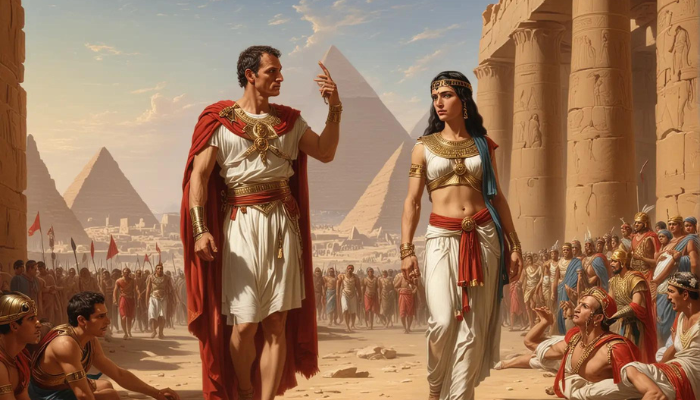
Their meeting was nothing short of legendary. According to historical accounts, Cleopatra had herself smuggled into Caesar’s quarters wrapped in a carpet (or bed linens, depending on the source). This bold move not only captured Caesar’s attention but also demonstrated her resourcefulness and courage. Their partnership, both personal and political, was immediately beneficial for Cleopatra.
- Reclaiming her throne: With Caesar’s military backing, Cleopatra was able to defeat her brother’s forces and reclaim her throne.
- The birth of Caesarion: Cleopatra and Caesar’s relationship resulted in a son, Ptolemy XV Philopator Philometor Caesar, known as Caesarion. His birth gave Cleopatra a stronger claim to her throne and a potential link to the future of Rome.
For Caesar, Cleopatra was more than just an ally—she was a key figure in his plans to expand Roman influence in the east. Their relationship wasn’t just about love or lust; it was about power. Cleopatra, ever the diplomat, leveraged her connection with Caesar to not only secure her rule but also strengthen Egypt’s position as a wealthy, autonomous kingdom amidst Rome’s growing empire.
- Strategic partnership: Cleopatra used her relationship with Caesar to protect Egypt from Roman annexation and ensure her kingdom’s independence.
- Caesar’s support: With Caesar’s army, Cleopatra was able to eliminate her brother Ptolemy XIII and secure Egypt as her own domain.
However, Cleopatra’s relationship with Caesar wasn’t just about power politics—it humanized her in the eyes of both Egypt and Rome. By bearing Caesar’s child, Cleopatra further entwined her fate with that of Rome’s, ensuring that Egypt would remain a key player in Roman affairs. Although Caesar was assassinated in 44 BC, leaving Cleopatra in a danger position, her influence did not wane. Cleopatra would go on to form another powerful alliance with Mark Antony, but her relationship with Caesar laid the foundation for Egypt’s continued involvement in Roman politics.
Cleopatra’s connection with Julius Caesar was a masterstroke of political strategy. Through their alliance, Cleopatra ensured her reign over Egypt and strengthened her position on the world stage. But this was only the beginning of her relationships with Rome’s most powerful men.
4. Cleopatra’s Rule and Her Reign
Cleopatra’s reign, which spanned from 51 BC to 30 BC, was not just defined by her relationships with powerful Roman leaders but also by her effective governance of Egypt. She was an astute ruler, deeply invested in the prosperity of her kingdom. As the last pharaoh of ancient Egypt, Cleopatra worked tirelessly to restore Egypt’s status as a major player in the Mediterranean world.
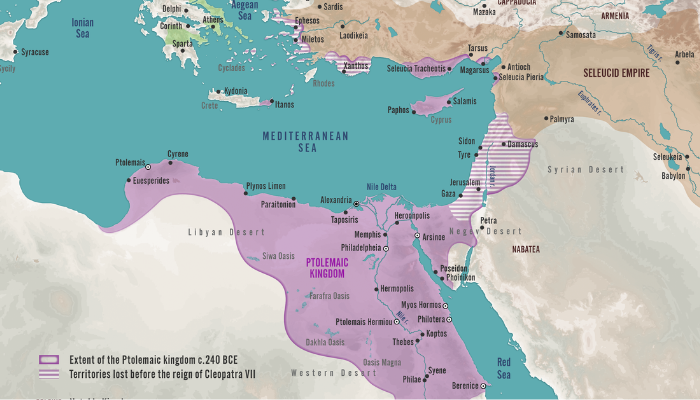
One of Cleopatra’s key focuses was the economy. Egypt was one of the richest nations of the time, largely due to its fertile lands and strategic location along important trade routes. Cleopatra leveraged this wealth to maintain her kingdom’s independence. By boosting trade and stabilizing Egypt’s economy, she ensured that her country remained prosperous, even as Rome loomed large on the horizon.
- Economic reforms: Cleopatra expanded Egypt’s trade with neighboring regions, strengthening its economic position.
- Protection of resources: She carefully managed Egypt’s resources, including its grain supply, which was critical for feeding both Egyptians and Romans.
Cleopatra was also known for her political diplomacy. She maintained Egypt’s independence through delicate negotiations with Rome, playing off the rivalries between Roman leaders to protect her own kingdom. She wasn’t just a passive ruler; she actively engaged with Roman politics to secure Egypt’s future.
- Diplomatic strategy: Cleopatra skillfully navigated the politics of Rome, balancing her relationships with Julius Caesar and later Mark Antony.
- Military preparedness: Cleopatra also strengthened Egypt’s military, ensuring her kingdom could defend itself if necessary.
Culturally, Cleopatra embraced both her Egyptian heritage and her Ptolemaic roots. She presented herself as a goddess to her people, often associating herself with the Egyptian goddess Isis, which enhanced her authority and legitimacy as a ruler. Cleopatra’s reign was unique in that she managed to blend Egyptian and Greek cultures, fostering a rich, multicultural society.
- Cultural legacy: Cleopatra promoted Egyptian traditions, even as she governed with a Greek influence, leaving a lasting cultural impact.
- Presentation as a goddess: By aligning herself with Egyptian deities, Cleopatra reinforced her divine right to rule, further cementing her place in Egyptian history.
Cleopatra’s rule was not just about maintaining power; it was about ensuring the stability and prosperity of Egypt. Her reign was a balancing act between internal governance and external diplomacy, and she managed it with remarkable skill. Cleopatra proved herself to be much more than a romantic figure in history—she was a powerful, intelligent ruler who fought to protect her kingdom against the growing might of Rome.
5. Cleopatra and Mark Antony: A Power Partnership
Cleopatra’s relationship with Mark Antony was another defining chapter of her reign. After Julius Caesar’s assassination, Rome was plunged into chaos, and Cleopatra had to navigate this unstable political landscape once again. In 41 BC, she formed a powerful alliance with Mark Antony, one of Rome’s most influential leaders and a member of the Second Triumvirate. But, like her relationship with Caesar, this was more than just a personal affair—it was a strategic move designed to strengthen Egypt’s position.
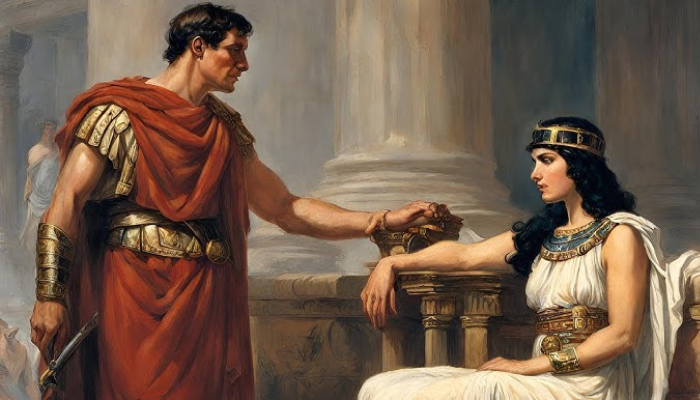
Mark Antony, needing resources and allies, looked to Cleopatra for support. Cleopatra, always thinking of Egypt’s future, saw Antony as a valuable partner. Together, they formed a political and personal bond that would last for years and dramatically shape both Egypt and Rome’s futures.
- Antony and Cleopatra’s meeting: Their first encounter was politically charged, with both parties recognizing the mutual benefits of their alliance.
- A powerful duo: By combining their forces, they sought to challenge the authority of Octavian, Julius Caesar’s heir, who was rising in power in Rome.
Antony and Cleopatra’s relationship wasn’t just based on mutual interests; they also shared a deep affection for one another. They had three children together, and Antony eventually recognized their son Caesarion, born from Cleopatra’s previous relationship with Caesar, as his heir. This cemented their partnership not only politically but also personally.
- Their combined ambitions: Both Cleopatra and Antony had grand visions for the future, with plans to expand their territories and challenge Rome’s dominance.
- Rivalry with Octavian: Their partnership eventually led to open conflict with Octavian, as Antony and Cleopatra sought to carve out their own power base in the Mediterranean.
However, this relationship also had its downfalls. Antony’s involvement with Cleopatra detached him from many in Rome, particularly Octavian, who saw them as a threat to his own ambitions. The political tensions escalated, and eventually, Antony and Cleopatra found themselves at war with Octavian. Their alliance, once full of promise and power, became their undoing as they faced defeat at the famous Battle of Actium in 31 BC.
- The Battle of Actium: A naval confrontation where Antony and Cleopatra’s forces were decisively defeated by Octavian, marking the beginning of the end for both.
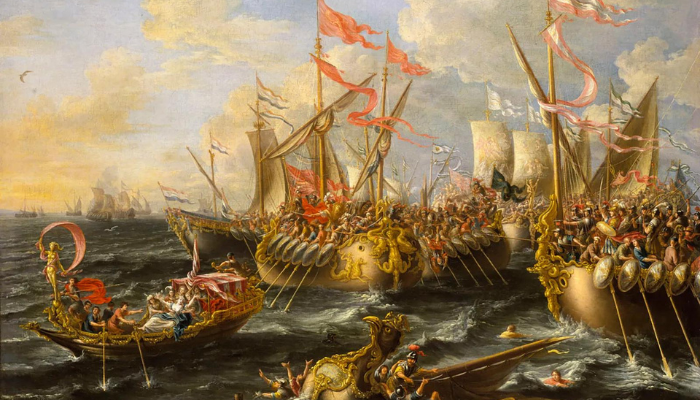
- The consequences of their defeat: With Octavian’s victory, the future of Cleopatra’s Egypt, and her own life, was cast into uncertainty.
Cleopatra’s partnership with Mark Antony was one of the most dynamic power alliances in history. Together, they dreamed of creating a new empire, but their ambitions were crushed by the might of Rome. This relationship was key in shaping Cleopatra’s later reign and marked the beginning of the end for both her and Egypt’s independence. Their downfall set the stage for the dramatic conclusion to Cleopatra’s life and rule.
6. The Fall of Cleopatra and Egypt
Cleopatra’s final years were defined by her dramatic fall from power, a series of events that would not only end her reign but also the independence of Egypt. After the destructive loss at the Battle of Actium in 31 BC, Cleopatra and Mark Antony retreated to Alexandria, knowing that their future was exposed. Octavian, Julius Caesar’s adopted heir and now the most powerful man in Rome, pursued them relentlessly, intent on bringing Egypt under Roman control.
Cleopatra was nothing if not resourceful, and even in these awful times, she sought a way out. She attempted negotiations with Octavian, hoping to secure a future for herself, her children, and her kingdom. Cleopatra reportedly even considered aligning with Octavian, using her charm and political skills to persuade him, but it was too late. Octavian was determined to take Egypt and eliminate any threats to his power.
- Failed negotiations: Cleopatra’s efforts to broker a deal with Octavian were unsuccessful, leaving her with few options.
- Antony’s downfall: As Octavian’s forces closed in, Mark Antony, defeated and demoralized, committed suicide after mistakenly believing Cleopatra had already taken her own life.
Cleopatra’s final act was one of daring. After Antony’s death, she knew that the end was near. Rather than being paraded through Rome as a captive, a fate Octavian had planned for her, Cleopatra chose to end her life on her own terms. The details of her death are legendary—many believe she used an asp, a poisonous snake, to take her life, though other accounts suggest poison or a self-inflicted wound. Regardless of the method, Cleopatra’s death in 30 BC marked the end of the Ptolemaic dynasty and the beginning of Roman Egypt.
- Cleopatra’s death: Her suicide was a powerful statement of independence, a turndown to be humiliated by her Roman conquerors.
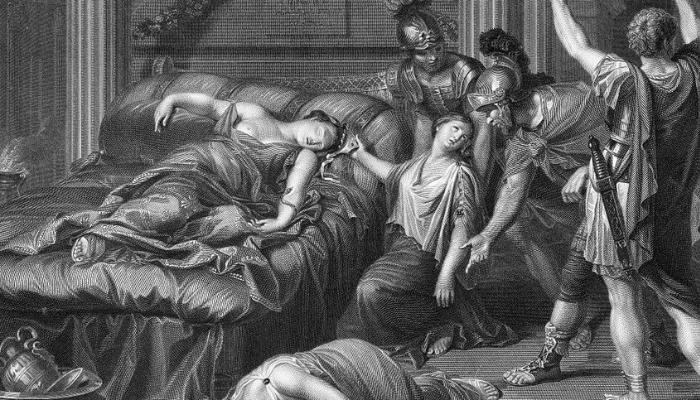
- Egypt’s annexation: With Cleopatra’s death, Egypt became a province of Rome, ending centuries of pharaonic rule.
The fall of Cleopatra and Egypt signaled the end of an era. Egypt, once a great and powerful kingdom, was now under Roman control, and Cleopatra’s legacy would forever be tied to her tragic end. But even in defeat, Cleopatra left an indelible mark on history. She had fought fiercely to preserve her kingdom, engaging with the most powerful men of her time and navigating an incredibly complex political landscape.
- Cleopatra’s legacy: Her death marked the end of Egyptian sovereignty, but her influence endured, as she became a symbol of intelligence, power, and defiance.
- The end of ancient Egypt: With Cleopatra’s fall, the ancient civilization of Egypt, as an independent entity, ceased to exist, transitioning fully into the Roman Empire.
7. Cleopatra’s Legacy in History
Cleopatra’s legacy is a rich tapestry woven from her political awareness, cultural influence, and tragic end. Over the centuries, she has become a symbol of beauty and power, but her true impact goes far beyond her romantic connections with influential Roman leaders. She represents a complex figure who navigated the tumultuous waters of politics in a male-dominated world, and her life story continues to captivate historians, writers, and artists alike.
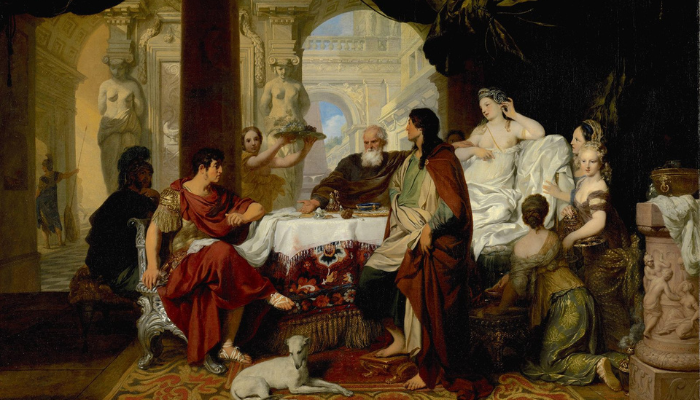
One of the most significant aspects of Cleopatra’s legacy is her role as a female leader in a time when women were often relegated to the background. She ruled Egypt in an era where female pharaohs were rare, and she actively engaged in the political and military affairs of her kingdom. Cleopatra’s ability to command armies, forge alliances, and engage with the most powerful men of her time demonstrates her exceptional leadership skills.
- Empowerment of women: Cleopatra’s reign inspires discussions about female leadership and empowerment in history.
- Political savvy: Her ability to navigate complex political landscapes highlights her intelligence and strategic thinking.
In addition to her political prowess, Cleopatra’s cultural impact was profound. She was known for her patronage of the arts, literature, and science, helping to foster a vibrant cultural environment in Alexandria. The city became a center of learning and culture, attracting scholars, philosophers, and artists from across the Mediterranean. Cleopatra’s reign marked a time of intellectual growth and cultural exchange that left a lasting legacy on Egyptian and Hellenistic culture.
- Cultural patronage: Cleopatra’s support for the arts contributed to the flourishing of culture in Alexandria, influencing future generations.
- Intellectual legacy: The blending of Egyptian and Greek cultures during her reign created a rich cultural tapestry that resonated through history.
Furthermore, Cleopatra’s story has inspired countless works of art, literature, and film, shaping her image as an iconic figure throughout history. From Shakespeare’s plays to modern movies, her life has been reinterpreted and romanticized, ensuring that her name remains synonymous with intrigue and allure.
- Artistic inspiration: Cleopatra’s life story has been depicted in various art forms, keeping her memory alive in popular culture.
- Symbol of mystery: Her enigmatic personality and tragic end continue to spark fascination and debate among scholars and the general public.
Ultimately, Cleopatra’s legacy is a multifaceted one. She was not just a beautiful queen but a clever and capable ruler who fought for her kingdom’s independence and navigated a dangerous political landscape. Her life story serves as a reminder of the complexities of leadership, the struggles of women in history, and the rich cultural heritage of ancient Egypt.
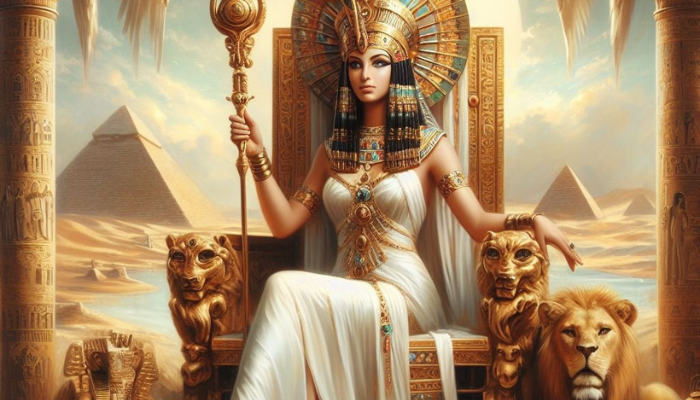
As we reflect on Cleopatra’s impact, we recognize her as a powerful symbol of strength, and intelligence. Her reign, marked by both triumphs and tragedies, continues to inspire and intrigue us, ensuring that the legacy of Cleopatra, the last pharaoh of Egypt, will endure for generations to come.
| Aspect | Details |
|---|---|
| Reign Duration | 51 BC to 30 BC |
| Title | Last Pharaoh of Egypt |
| Key Focus Areas | – Economic stability – Political diplomacy – Cultural development |
| Economic Reforms | – Expanded trade with neighboring regions – Managed grain supply |
| Political Strategies | – Formed alliances with Julius Caesar and Mark Antony – Navigated Roman politics skillfully |
| Military Preparedness | – Strengthened Egypt’s military capabilities – Engaged in conflicts to protect Egypt’s sovereignty |
| Cultural Impact | – Promoted arts, literature, and science in Alexandria – Blended Egyptian and Greek cultures |
| Presentation as Ruler | – Associated with Egyptian goddess Isis – Reinforced divine right to rule |
| Notable Relationships | – Julius Caesar (political and personal alliance) – Mark Antony (strategic partnership) |
| Significant Events | – Reclaimed throne with Caesar’s help – Battle of Actium defeat – Final suicide to avoid captivity |
| Legacy | – Symbol of female leadership and resilience – Lasting cultural and historical influence |
Glossary section, highlighting difficult words from the article about Cleopatra, along with their synonyms and simple explanations for easy readability:
| Word | Synonym | Explanation |
|---|---|---|
| Pharaoh | King/Queen | The ruler of ancient Egypt. |
| Dynasty | Family line | A series of rulers from the same family. |
| Astute | Clever/Sharp | Having or showing the ability to accurately assess situations or people. |
| Navigated | Maneuvered | To plan or direct a course through a complex situation. |
| Alliance | Partnership | A formal agreement between two or more parties for mutual benefit. |
| Cultural | Artistic/Social | Related to the ideas, customs, and social behavior of a society. |
| Patronage | Support | The support given to artists, writers, and scholars. |
| Intellectual | Knowledgeable | Related to the ability to think and understand complex ideas. |
| Legacy | Heritage/Impact | Something handed down by a predecessor or left behind after someone’s death. |
| Sovereignty | Independence | The authority of a state to govern itself. |
| Resilience | Toughness | The ability to recover quickly from difficulties. |
| Romanticized | Idealized | To make something seem better or more appealing than it is. |
| Political landscape | Political environment | The political situation and conditions in a specific area. |
| Turbulent | Chaotic/Disordered | Characterized by conflict, disorder, or confusion. |
| Endeavor | Effort/Attempt | An attempt to achieve a goal. |

